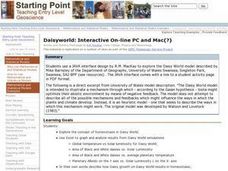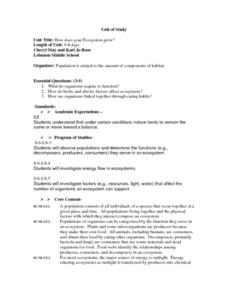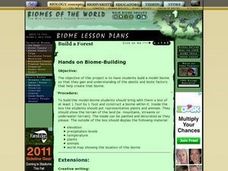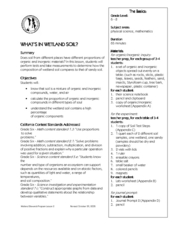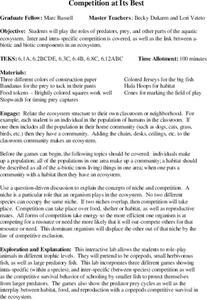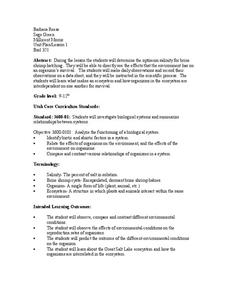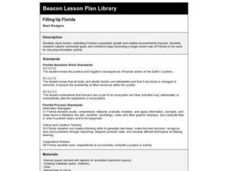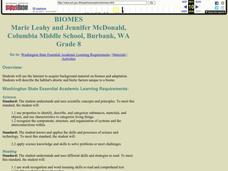Curated OER
Our Schoolsyard is Full of Biology
Students study the habitats found in their schoolyard. They apply firsthand, what they have learned in the classroom to something familiar to them. Students look at biotic, abiotic habitats. Small groups will present their findings to...
Curated OER
Biome EcoWatch Project
Students work together to complete the Biome EcoWatch project. Using the Internet, they research the relationship between abiotic factors and living organisms within a biome. They create a multimedia presentation to share their...
Curated OER
Lotic Environment
Students assemble a classroom river model as an example of a lotic system. They control and measure biotic and abiotic information for the in-class system and compare data with a lotic system in a natural environment.
Curated OER
Lotic Environment Lesson Plans
Learners create and conduct experiments on a "classroom river habitat." They manipulate the biotic and abiotic factors so that they are able to compare an artificially prepared river model to a naturally occurring lotic ecosystem.
Curated OER
Spatial Characterization of Animal Movement
Students identify biotic and abiotic factors which may alter the observed patterns in plant communities with different structural characteristics, climate, or environmental constraints.
Curated OER
Succession and Experimental Process
Students describe the roles of controlled, manipulated and responding variables in scientific research. They also identify biotic and abiotic interactions affecting the makeup of a plant community.
Curated OER
Strands Walk An Ecological Observation
Students examine an ecosystem and analyze the role of two abiotic factors in the ecosystem. In this ecosystem lesson students complete an activity on their ecosystem.
Curated OER
Daisyworld: Interactive On-line PC and Mac
Students use a JAVA interface to explore the Daisy World model to illustrate a mechanism through which - according to the Gaian hypothesis - biota might optimize their abiotic environment by means of negative feedback.
Curated OER
How Does Your Ecosystem Grow?
Students consider that under certain conditions in nature tend to remain the same or move toward a balance. They observe populations and determine the functions (e.g., de-composers, producers, consumers) they serve in an ecosystem. They...
Curated OER
Hands on Biome-Building: Build a Forest
Students explore Earth science by identifying environmental factors. In this biome lesson, students discuss the importance of a functioning ecology and design a biome diorama. Students utilize images of trees and plants which represent a...
Curated OER
Forest In A Jar
Tenth graders are introduced to the process of succession and gain awareness of the changing nature of ecosystems. They demonstrate a comprehension of the dynamic nature of ecosystems, including the relationship between ecological...
Curated OER
Make it a habitat
Students consider the adaptation of life forms through natural selection to fill various niches and accommodate changing environmental conditions. They select an ecosystem and conduct research to provide as much detailed information as...
Curated OER
What's in Wetland Soil?
Students examine the organic and inorganic components of soil. For this environmental science lesson, students identify the factors that influence soil formation. They collect soil samples, conduct tests, and analyze the results.
Curated OER
Ecosystems
Your students will definitely understand what the word ecosystem means after viewing this slide show. The word ecosystem is broken down to its root meaning, described with examples, and then defined by the factors that comprise it. Note:...
Curated OER
Compettion at its Best
Sixth graders role play predators, prey and other parts of the aquatic ecosystem. They show inter and intra-specific competition as well as the link between abiotic and biotic components in an ecosystem. Students play games about the...
Curated OER
Nature Notes
Students spend some time outdoors and record their observations of abiotic conditions, geologic surroundings and living organisms. They reflect and write about the experience of being observant in nature.
Curated OER
Hatching Brine Shrimp
Third graders investigate the environment that is considered favorable for brine shrimp hatching. The salinity level is of particular interest in the observations because the optimum level is needed for survival. They make daily...
Curated OER
Ecological Relationships
Middle schoolers identify ecological elements and their factors on species, populations and food webs. They analyze ecosystems for these elements and research how these factors influence species survival rate. Predictions on conditions...
Curated OER
Populations and Ecosystems
Sixth graders examine the factors that influence the stability of ecosystems. They construct a miniature ecosystem in a jar that includes plants, small fish, and snails, record the population changes over a period of four weeks, and...
Curated OER
Filling Up Florida
Students study factors controlling Florida's population growth and related environmental impacts. They research natural community types and construct maps (including a large-sized map of Florida) to be used for a simulation activity.
Curated OER
Norman Suburban Activity
Students analyze the factors affecting organisms in the pond ecosystem. In this environmental science lesson, students perform an experiment to determine pH, nutrients and temperature of different pond sites. They present their result to...
Curated OER
Fire Ecology
Fourth graders examine the role fire plays in maintaining the physical factors of the scrub ecosystem. They see that world ecosystems are shaped by physical factors that limit their productivity.
Curated OER
ProjectWILD Aquatic: Migration Headache
Students explore the important factors that affect habitat quality and the associated survival of migratory water bird populations. They discuss an organisms dependency upon a variety of habitats and habitat quality. Students play a game...
Curated OER
Biomes
Eighth graders use the Internet to research biomes and how animals adapt. They describe habitat's features and factors that are unique to the biome they are researching. They also participate in activities.
Other popular searches
- Biotic Abiotic
- Biotic and Abiotic Factors
- Biotic and Abiotic
- Abiotic Biotic Environment
- Abiotic Elements
- Abiotic and Biotic Elements
- Abiotic and Biotic Resources
- Biotic Abiotic Factors
- Abiotic Biotic Lab
- Ecosystems Abiotic Biotic
- Biotic Abiotic Pictures
- Abiotic Factors River









